Sports in Europe; Kansai Gaidai, College of Global studies, May 2020 (Online course)
Friday, July 3, 2020
Friday, May 15, 2020
New open access book: Japan Through the Lens of the Tokyo Olympics
Copied from the official site: https://www.taylorfrancis.com/books/e/9781003033905


Japan Through the Lens of the Tokyo Olympics Open Access
Edited By Barbara Holthus, Isaac Gagné, Wolfram Manzenreiter, Franz Waldenberger
Edition 1st Edition
First Published 2020
eBook Published 23 April 2020
Pub. location London
Imprint Routledge
Pages 162 pages
eBook ISBN 9781003033905
SubjectsArea Studies, Sports and Leisure
This book situates the 2020 Tokyo Olympics within the social, economic, and political challenges facing contemporary Japan.
Using the 2020 Tokyo Olympics as a lens into the city and the country as a whole, the stellar line up of contributors offer hidden insights and new perspectives on the Games. These include city planning, cultural politics, financial issues, language use, security, education, volunteerism, and construction work. The chapters then go on to explore the many stakeholders, institutions, citizens, interest groups, and protest groups involved, and feature the struggle over Tokyo’s extreme summer heat, food standards, the implementation of diversity around disabilities, sexual minorities, and technological innovations. Giving short glimpses into the new Olympic sports, this book also analyses the role of these sports in Japanese society.
Japan Through the Lens of the Tokyo Olympics will be of huge interest to anyone attending the Olympic Games in Tokyo 2020. It will also be useful to students and scholars of the Olympics and the sociology of sport, as well as Japanese culture and society.
Using the 2020 Tokyo Olympics as a lens into the city and the country as a whole, the stellar line up of contributors offer hidden insights and new perspectives on the Games. These include city planning, cultural politics, financial issues, language use, security, education, volunteerism, and construction work. The chapters then go on to explore the many stakeholders, institutions, citizens, interest groups, and protest groups involved, and feature the struggle over Tokyo’s extreme summer heat, food standards, the implementation of diversity around disabilities, sexual minorities, and technological innovations. Giving short glimpses into the new Olympic sports, this book also analyses the role of these sports in Japanese society.
Japan Through the Lens of the Tokyo Olympics will be of huge interest to anyone attending the Olympic Games in Tokyo 2020. It will also be useful to students and scholars of the Olympics and the sociology of sport, as well as Japanese culture and society.
TABLE OF CONTENTS
chapter 1|7 pages
Understanding Japan through the lens of Tokyo 2020
With Barbara Holthus, Isaac Gagné, Wolfram Manzenreiter, Franz Waldenberger
PDF 0.72MB
PDF 0.93MB
PDF 0.26MB
PDF 0.27MB
PDF 0.67MB
PDF 0.26MB
PDF 0.67MB
PDF 0.26MB
chapter 9|6 pages
Herculean efforts
What the construction of the Olympic Stadium reveals about working conditions in Japan 1
With Steffen Heinrich
PDF 0.99MB
chapter 10|7 pages
Tokyo 2020 and neighborhood transformation
Reworking the entrepreneurial city
With Ralph Lützeler
PDF 1.40MB
PDF 0.26MB
chapter 12|5 pages
Tokyo’s architecture and urban structure
Change in an ever-changing city
With Florian Purkarthofer
PDF 0.94MB
PDF 0.90MB
PDF 0.30MB
PDF 0.26MB
PDF 0.28MB
PDF 0.25MB
chapter 18|7 pages
Tokyo’s 1940 “Phantom Olympics” in public memory
When Japan chose war over the Olympics
With Torsten Weber
PDF 0.83MB
chapter 19|7 pages
Upgrading Tokyo’s linguistic infrastructure for the 2020 Games
With Peter Backhaus
PDF 1.23MB
PDF 0.26MB
chapter 21|7 pages
The Paralympic Games
Enabling sports and empowering disability
With Katharina Heyer
PDF 0.71MB
PDF 0.26MB
chapter 23|6 pages
Games of romance?
Tokyo in search of love and Unity in Diversity
With Nora Kottmann
PDF 0.33MB
chapter 24|2 pages
The 2020 Olympic mascot characters
Japan wants to make a difference
With Jan Lukas Kuhn
PDF 0.89MB
chapter 25|6 pages
Olympic education
How Tokyo 2020 shapes body and mind in Japan
With Wolfram Manzenreiter
PDF 1.15MB
PDF 0.26MB
chapter 27|6 pages
Volunteering Japan-style
“Field cast” for the Tokyo Olympics
With Barbara Holthus
PDF 0.84MB
chapter 28|6 pages
The difference between zero and one
Voices from the Tokyo anti-Olympic movements
With Sonja Ganseforth
PDF 0.91MB
PDF 0.70MB
PDF 0.76MB
chapter 31|6 pages
Olympic leverages
The struggle for sustainable food standards
With Sonja Ganseforth
PDF 0.33MB
PDF 0.71MB
chapter 33|1 pages
The Olympic and Paralympic Games as a technology showcase
With Franz Waldenberger
PDF 0.26MB
PDF 0.27MB
Friday, April 10, 2020
Article of the day : Why sports still matter – even in a time when you can't actually watch any
Why sports still matter – even in a time when you can't actually watch any
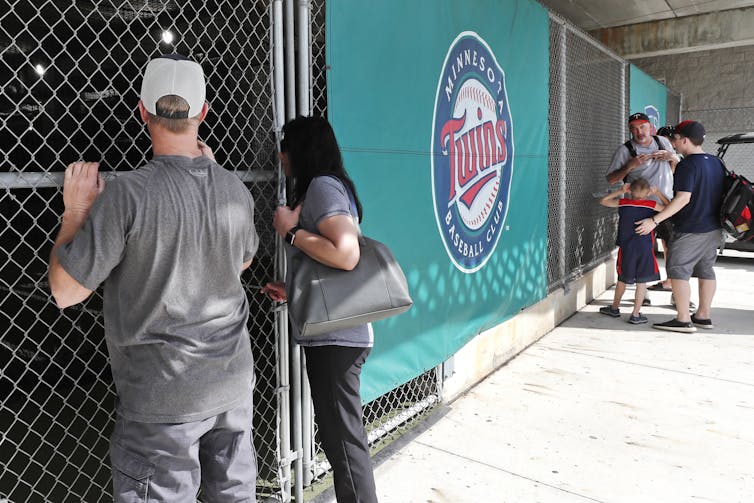
Most of the sports world has ground to a halt over the coronavirus pandemic. The Tokyo Olympic Games, the NBA season, and soccer’s Champions League, along with many other major tournaments, have been postponed. Wimbledon has been canceled for the first time since World War II. These cancellations and postponements go all the way down to recreational competitions.
Given the impact that any large gathering could have on the further spread of the pandemic, several sports commentators, noted that at this point in time, sports did not matter. The New York Times sports commentator wrote, “Postpone it, cancel it, whatever. There are more important things to think about. It is a sport, after all,” referring to the cancellation of soccer’s Champions League.
The present sentiment is a reminder of a popular phrase typically attributed to former coach and player Arrigo Sacchi that soccer was “the most important of the unimportant things in life.”
At a time when the utmost urgency on everyone’s mind is the fragility of life itself, this couldn’t appear to be more true.
At the same time, as philosophers of sport, we believe that it is important to recognize the role sports play in our lives – even in difficult times.
The nature of sports
The point of sports, as philosopher Bernard Suits argues, lies in voluntarily attempting to overcome artificial problems erected by the rules.Such rules stipulate the use of specialized physical skills to achieve the goal of the game. For instance, the rules of soccer prohibit players to hit the ball with their hands but allow kicking and heading to put the ball into the net.
Sports are activities governed, as Suits explains, by a “gratuitous logic.” Under this logic, participants attempt to solve an unnecessary problem, such as kicking a ball around a field and into a net, just for the sake of solving the problem.
The value of sports
At the same time, there are those who argue that sports fulfill human functions that are far from gratuitous. For instance, sports provide an arena for honing different kinds of capacities and fostering character development.Philosopher José Ortega y Gasset argues that the gratuitous character of sports is a model for living well – for a life with plenty of vitality.
He recommends individuals approach their lives with the “same spirit that leads them to engage in sport.” That is, individuals should fill their lives with challenging activities that are not necessary but voluntary.
Similarly, philosopher Thomas Hurka includes sports among some of the challenging activities that require dedication, planning and precision.
Hurka highlights that these activities are valuable because of the effort required by the experience of trying to achieve. In his words, “We don’t call crossing your fingers an achievement because it’s too easy. Achievements have to be challenging, and the more challenging the better.”
Sports and perfection
The attempt to achieve difficult goals requires a certain dedication. In this sense, engagement in sport represents a perfectionist way of life.As philosopher John Rawls proposes in his discussion on justice and the good life, perfectionism requires the utmost dedication to achieve human excellence; in this case, we argue, of the athletic variety.
In this regard, moral philosopher Derek Parfit, a colleague of Rawls, maintains that perfectionism involves the achievement or realization of “the best things in life.”
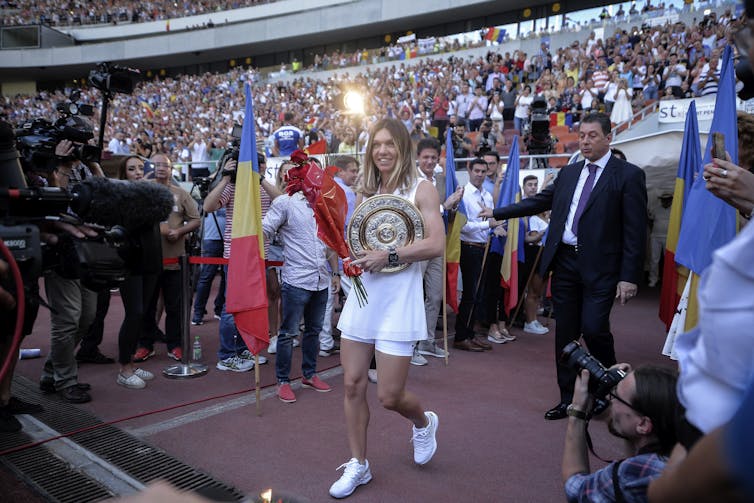
From a perfectionist standpoint then, living well requires individuals to commit themselves wholeheartedly to an enterprise.
Sports are equipped to provide such zeal. That is, through their commitment to a particular sport, individuals build passion for their practice and develop the zeal to pursue perfection.
Sports and the community
Sports also connect people. Drawing on anthropologist Clifford Geertz’s work on Balinese cockfighting, sport scholars point out that sports help human communities tell stories about themselves. In other words, sports allow humans to generate a common identity.In addition to understanding themselves as individuals through their sporting activities, people also understand themselves as members of communities by engaging in sports. No contemporary nation with an established soccer culture can be fully understood without analyzing their passion for soccer.
For example, the Spanish national soccer teams have long been known for displaying a combative and team-based play style referred to as “La Furia Roja,” or the red fury. When Spaniards face adversity and have to come together and collectively overcome challenging situations, they refer to themselves as people who embody the red fury, mirroring their national teams’ play style.
Another example that sport historian Mark Dyreson puts forth is that America’s long-standing involvement in international sports has fostered discussions and struggles over equity, power and fairness.
Consider Tommie Smith and John Carlos raising their fists in a Black Power salute during the medal ceremony for the 200-meter dash at the 1968 Mexico City Olympic Games, which was meant to call attention to racism in America.
All this is not at all to say that we want governments to loosen restrictions and resume sports competitions. Rather this is a reminder of why sports are valuable and also sorely missed by many people around the world.
[Get facts about coronavirus and the latest research. Sign up for The Conversation’s newsletter.]
Francisco Javier López Frías, Assistant Professor of Kinesiology, Pennsylvania State University and Cesar R. Torres, Professor, Department of Kinesiology, Sport Studies and Physical Education, The College at Brockport, State University of New York
This article is republished from The Conversation under a Creative Commons license. Read the original article.
Article of the day : With everyone stuck indoors, esports is poised for its time in the sun
With everyone stuck indoors, esports is poised for its time in the sun
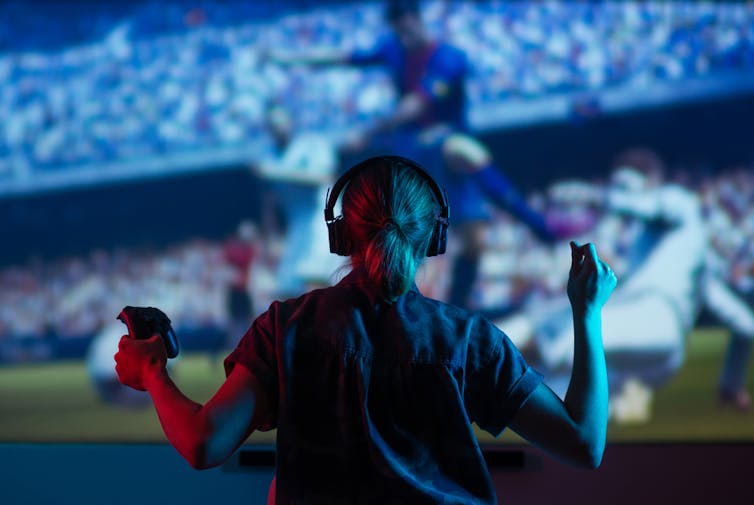
Against a global backdrop of cancelled sports leagues, and as part of their season opening, National Rugby League (NRL) fans recently packed the stands of Townsville’s new Queensland Country Bank Stadium.
Fortunately, professional sporting bodies have now realised social distancing measures can’t be ignored. To maintain fan engagement, sports leagues must rethink their mode of delivery.
Esports is one promising option. This fast-growing, professional video game competition medium is played between individuals or teams. While it encompasses non-sport games, in the context of sports-based games, esports offers an alternate reality where athletes are digitally represented.
Esports is now drawing mass appeal, fitting easily into the online lives many of us lead.
Read more: Stadiums are emptying out globally. So why have Australian sports been so slow to act?
Response in uncertain times
Sports administrators are now faced with unprecedented disruption. Avid sports fans are self-isolating at home, cabin fever is setting in and they are craving their usual sports fix.Initially, NRL and AFL administrators tried to maintain their season fixtures with no fans, but this quickly became untenable.
As we hunker down for the long haul, extending the AFL season suspension beyond May looks increasingly likely, making the prospect of esports all the more appealing.
Future proofing with esports
The financial cracks in Australia’s leading professional sports leagues are not confined to COVID-19.Falling free-to-air television views and decreased numbers of match spectators pose a significant commercial threat. Generating revenue primarily from television broadcast rights is no longer sustainable. Thus, esports represents more than a season filler – it’s an opportunity sports administrators have largely ignored, but may need to quickly school themselves on.
Even before this pandemic hit, Australian sports fan engagement was changing. Data released in 2017 showed 11.4 million Australians consumed sports on a smartphone, desktop or tablet during July that year – a 6% increase from June. Growth was 10% among women, compared to 3% among men.
For Australian sports fans, the jump to esports would require little change in consumer behaviour. Other countries are already seeing this shift. The US Major League Soccer (MLS) administrators found 65% of their most devoted fans highlighted FIFA gaming as driving their interest in soccer.
“Gaming is actually more important to us than people playing soccer itself,” said MLS senior director of properties James Ruth.
Last year, a record breaking number (109,000) of worldwide participants competed in Formula 1’s Pro Draft, one stage of the 2019 Formula 1 New Balance Esports Series.
Read more: Are esports the next major league sport?
Esports and COVID-19
Formula 1 has led the rollout of esport contingencies during COVID-19, showing commitment by launching their Virtual Grand Prix series. Running in place of races planned for the postponed season, and featuring several virtual F1 drivers, fans at home can still get their F1 fix.The National Basketball League (NBA) are more hesitant, but have dipped their toes in the water by promoting an esport competition featuring 16 of the NBA’s top basketball players. It’s likely we’ll see more sporting codes act and experiment with new modes of delivery in the near future.
In Australia, not all clubs were slow to recognise the potential of esports. More than four years ago, Adelaide Crows officials realised their traditional revenue streams were “maxed out” and identified esports as an avenue for growth.
However, the AFL’s commitment has been tentative at best. The NRL have also yet to make any real inroads, but did partner with an Australasian esports media company for a Fortnite event last year.
Not a gendered activity
Esports, like real sports, is not just for men. Research suggests women and men play video games in about equal numbers. According to Venture Bear, in the US alone 11 million women watched a live stream on Twitch last year.In the Australian market, commercial growth through esports investment could be an influential strategy to seed youth leagues. As marketers seek to attract new fans and strengthen existing fan affiliations, esports’ effects could be twofold.
Esports could attract a new wave of younger sports fans, and bring ancillary opportunities to deepen existing fan engagement.
Read more: Time well spent, not wasted: video games are boosting well-being during the coronavirus lockdown
Keeping traditions going
As we all settle into the pandemic way of life, Australian sports administrators may need to shift from dabbling in esports to developing a more sophisticated and comprehensive esports strategy.Reliance on traditional income streams and “bums on stadium seats” have left our sports vulnerable and in some cases, looking for a bailout.
Perhaps administrators missed the opportunity to pivot quickly, keeping their fans engaged, their staff employed and their future secure. Either way, during these troubled times, esports may help breathe new life into one of the country’s favourite pastimes.
Michelle O'Shea, Senior Lecturer Sport Management, Western Sydney University and Sarah Duffy, Lecturer, School of Business, Western Sydney University
This article is republished from The Conversation under a Creative Commons license. Read the original article.
Friday, March 27, 2020
Article of the day: Why the fall-out from postponing the Olympics may not be as bad as we think
Why the fall-out from postponing the Olympics may not be as bad as we think
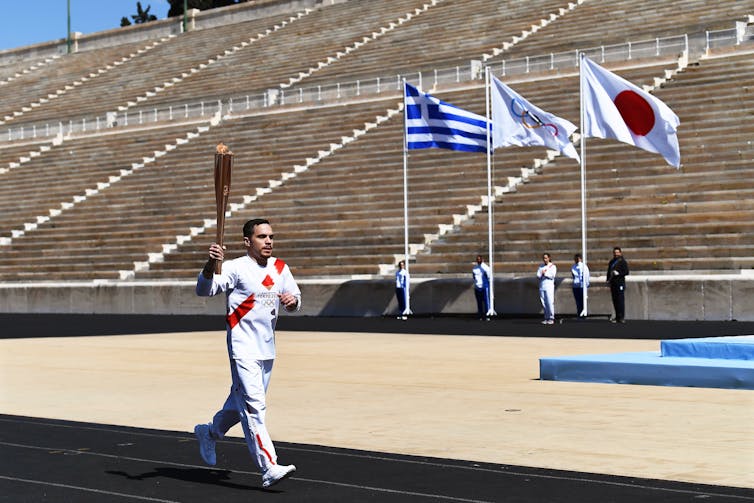
At the 125th IOC Session in Buenos Aires in 2013, Tokyo won the right to host the Summer Olympics in 2020. The city was to join Athens, London, Paris and Los Angeles in the small group that have hosted a summer Olympics more than once.
Tokyo will now have to wait for most likely a year to join this exclusive club, however, after finally giving in to international pressure and deciding to postpone the games due to the coronavirus pandemic.
The pressure had been building over the past few days, led by Canada and Australia, both of which said they would not send athletes to Tokyo this year.
Stakeholders in the US, including the governing bodies of gymnastics, track and field and swimming, also called for the games to be postponed. Their messages carried extra weight as the three events are key anchors of the Olympics and of special importance to broadcasters in the US.
Read more: Why haven't the Olympics been cancelled from coronavirus? That's the A$20bn question
There were other complications, as well. Sporting events have been cancelled or postponed around the world, making qualifying for the Olympics difficult for nearly half of all athletes expected to take part.
It was also becoming impossible to continue anti-doping testing to any meaningful degree.
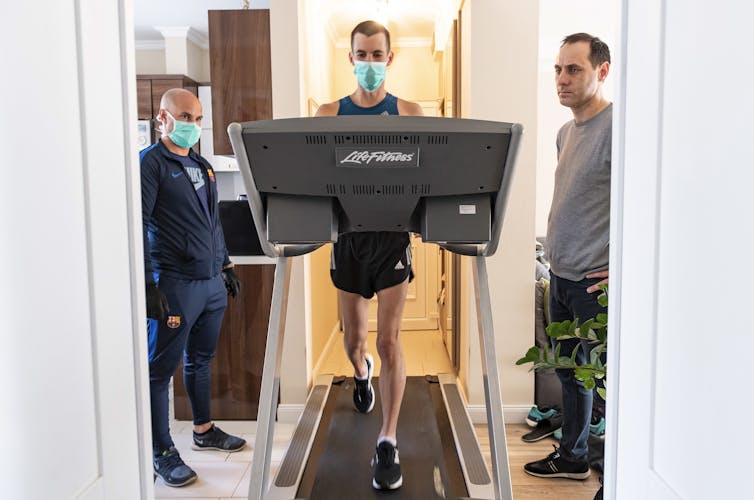
Only concerned about the bottom line
The IOC has been sharply criticised for its recalcitrance in not postponing the games sooner. Some have suggested its brand has suffered as a result.There is no doubt that holding the Olympic flame ceremony in Greece and continuing with the torch relay was tactless at a time when fatality rates from the coronavirus were spiking in Europe and governments around the world were urging their citizens not to travel and stay away from public events.
The IOC’s decision to continue with these ceremonies and its dilatory and dithering response to the pandemic in general left it open to criticism that it cared only about the impact a postponement might have on its revenues.
It must be remembered that, although the IOC is an immensely rich and influential entity, it has in effect only one asset – the Olympic Games – to commercially exploit. And these come around only every two years.
But we can only speculate as to the role money played in the IOC’s reluctance to postpone the games.
To be fair to the IOC, it has said consistently that any decision on Tokyo 2020 would be guided by the health and welfare of the athletes and spectators, and based on the advice of recognised authorities such as the WHO.
The challenge of cancelling or moving the games
The logistics of reorganising an Olympics involving 11,000 athletes and thousands of support personnel and spectators will certainly be a significant undertaking. But this stands in stark contrast to the exponentially bleak figures of the toll of the virus – 12,000 confirmed cases of coronavirus on February 1, 87,000 on March 1 and now over 335,000 worldwide.While Olympics have been postponed, cancelled and moved in the past, this has been mainly due to the outbreak of war. (Tokyo was, for example, supposed to host the 1940 Games before they were cancelled due to the second world war.)
Indeed, the current host city contract specifically states in clause 66 that if the host country is in a state of war or civil disobedience, the IOC can at its sole discretion terminate the contract.
Natural disasters have affected the games in the past. The 1908 Olympics, originally to be held in Rome, had to be moved to London when Mount Vesuvius erupted and the Italian government was forced to divert money to projects such as the rebuilding of Naples and not the construction of Olympic venues.
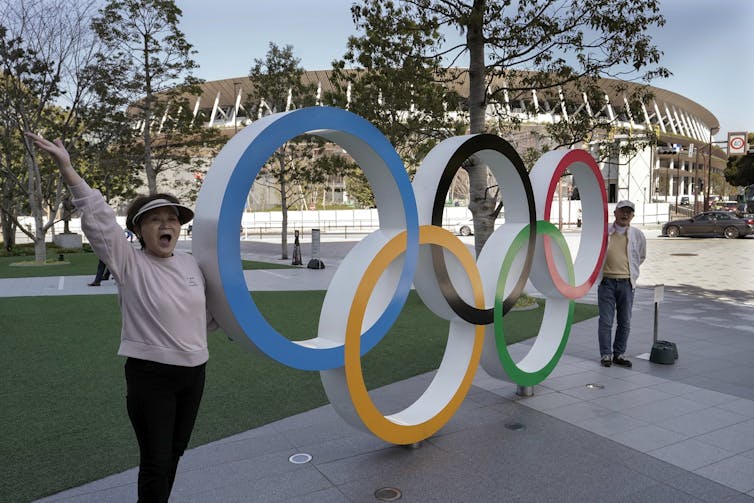
It is unlikely the IOC will seek to move this year’s Tokyo Games to another city. Logistically, it would be very difficult for any country to host the games on such short notice, especially given the massive investment in physical infrastructure required at a time when the world is pumping billions into stimulus packages for their economies.
It is also not in Japan’s interest to see the games moved. Under the host city contract, the failure to host the games is one of the specific contingencies that allows the IOC to unilaterally terminate the contract without affecting its rights to claim compensation against the Tokyo organising committee.
In addition, in cases when the IOC does unilaterally terminate the contract, the organising committee agrees to waive its right to receive any form of compensation from the IOC.
Further, the organisers (effectively, Japanese taxpayers) also agree to “indemnify and hold harmless” the IOC from any third party claims in respect of the IOC’s withdrawal from the games, such as those from broadcasters.
Then there’s the small fact that Japan has already invested A$20billion in the games.
Read more: Coronavirus: For the sake of athletes, it's too soon to cancel the Tokyo 2020 Olympics
Moving the games to later in 2020 is likely not an option given the accelerating nature, for now, of the coronavirus. Hosting the games in September or October would also wreak havoc with the scheduling of both athletes and broadcasters (although the 1964 Tokyo Olympics were held in mid-October).
As we saw from the Rugby World Cup held in Japan last year, moving into autumn also coincides with the typhoon season. And the Olympics would have to contend with the football seasons in Europe and the US at that time of year.
This leaves organisers with one decent option – delaying for a full year until the summer of 2021.
Why legal claims are unlikely
Apart from the logistical challenges of postponing the games, there are significant commercial considerations related to ticketing, broadcasting and sponsors. In simple terms, those holding tickets, those with the rights to broadcast the Olympics and those with exclusive “official” sponsorships may now attempt to seek their money back in full or in part.The Tokyo organisers and the IOC might argue that so-called force majeure clauses apply and that the contractual commitments given to sponsors and broadcasters have been disrupted by an unforeseen, natural cause.
There are already reports the Tokyo 2020 ticketing policy says organisers would not be held responsible if the Olympics are cancelled due to a number of “force majeure” incidents, including natural disasters, war and “states of emergency connected to public health.”
If any broadcaster or sponsor tries to engage in legal action at a time when the world is facing its most serious public health emergency in a century, this may not sit well with their viewers or customers. The commercial losses sustained by large corporate sponsors for an event that can be rescheduled will engender little public sympathy at the moment.
If the Olympics do go ahead in 2021, it can then be a global celebration of the talent, hard work and resilience of the world’s leading athletes.
For now, the world needs to support the talent, hard work and resilience of the world’s leading health professionals. They truly have an Olympian task ahead.
Jack Anderson, Professor of Sports Law, Melbourne Law School, University of Melbourne
This article is republished from The Conversation under a Creative Commons license. Read the original article.
Monday, March 23, 2020
Japan Focus. Special Issue: Japan’s Olympic Summer Games - Past and Present, Part II
(Japan Focus is an excellent open access journal)
Introduction for Part II by Jeff Kingston
Olympic Moment
1 - William Kelly - Bringing the Circus to Town: An Anatomy of the Olympic Movement
2 - Stephen Wade - Did the 2016 Olympics change Rio de Janeiro? Not Much - At Least Not for the Good
Fool’s Gold
3 - David McNeill - Spinning the Rings: The Media and the 2020 Tokyo Olympics
4 - Michael A. Leeds - Can Cities Bring Home the Gold?: What Economic Theory Tells Us about Hosting the Olympic Games
5 - Eva Marikova Leeds - Tokyo 2020: Public Cost and Private Benefit
Paralympics
6 - Anoma P. van der Veere - The Tokyo Paralympic Superhero: Manga and Narratives of Disability in Japan
7 - Susan S. Lee - Promises of Accessibility for the Tokyo 2020 Games
Looking Back
8 - Mark Schreiber - 1940 Tokyo: The Olympiad that Never Was
9 - Christian Tagsold - Symbolic Transformation: The 1964 Tokyo Games Reconsidered
Dissenting Opinions
10 - Taro Nettleton - Light, Currency, Spectacle, and War: Kobayashi Erika’s She Waited (2019)
11 - Koide Hideaki, translated by Norma Field - The Fukushima Nuclear Disaster and the Tokyo Olympics
12 - Shaun Burnie - Radiation Disinformation and Human Rights Violations at the Heart of Fukushima and the Olympic Games
13 - Akihiro Ogawa - As If Nothing Had Occurred: Anti-Tokyo Olympics Protests and Concern Over Radiation Exposure
14 - Sonja Ganseforth - Anti-Olympic rallying points, public alienation, and transnational alliances
15 - William Andrews - Playful Protests and Contested Urban Space: the 2020 Tokyo Olympics Protest Movement
16 - Alexis Dudden - An Opportunity for Japan to Change People’s Perception
17 - Sean Michael Wilson, illustrated by Makiko Kodama - ‘Tokyo and Olympics Guide’
Friday, March 20, 2020
Article of the day: Coronavirus: For the sake of athletes, it's too soon to cancel the Tokyo 2020 Olympics
Coronavirus: For the sake of athletes, it's too soon to cancel the Tokyo 2020 Olympics
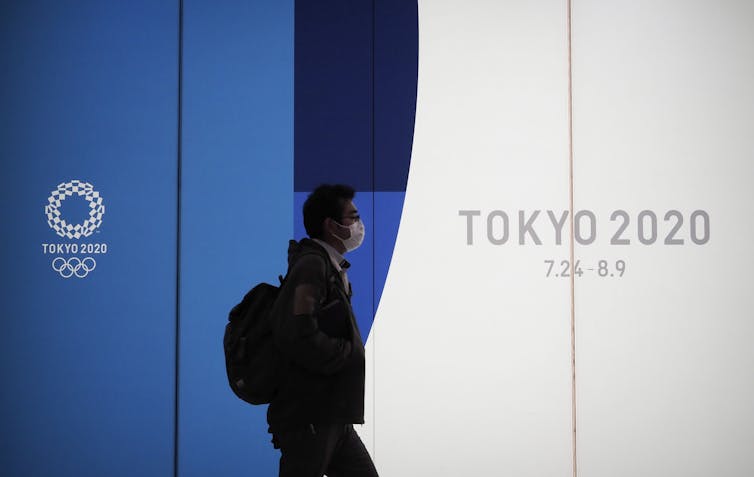
For many people, the COVID-19 pandemic became real when professional sports leagues around the world suspended their seasons. Amateur competitions followed suit, with many international sports federations cancelling their championships. But what about the Tokyo 2020 Olympic Games?
The International Olympic Committee continues to support Tokyo 2020’s preparation and encourage athletes to train for the Games scheduled to be held July 24 to Aug. 9.
The IOC’s approach should not come as a surprise. Since the start of the modern Olympics in 1896, only the 1916, 1940 and 1944 Games have been cancelled — and that was because of the First and Second World Wars. The 1920 Olympic Games went ahead after the 1918 Spanish flu pandemic, a deadly strain of influenza that infected close to 500 million people globally and claimed the lives of approximately 50 million people.
Now, 100 years later, the IOC and Tokyo 2020 are faced with an eerily similar pandemic, raising questions about whether the Games should be cancelled for the fourth time in history.
Since the beginning of the COVID-19 outbreak, there have been concerns raised about the perceived health risks of holding the Olympics. As Japan experienced rising numbers of cases in February, IOC member Dick Pound suggested organizers had until May to make a final decision.
Decision rests with IOC
Amid these fears, Japan’s Prime Minister Shinzo Aby stated: “We will overcome the spread of the infection and host the Olympics without problem, as planned.” IOC president Thomas Bach has made similar statements; ultimately, the decision lies with the IOC.The financial costs of hosting such a massive global event also weigh heavily on any decisions. The official budget for hosting the Tokyo Games is $US12.6 billion, with $7 billion to be covered by the Government of Japan and the Tokyo Metropolitan Government and $5.9 billion from IOC contributions, sponsorship, licensing and ticket sales. However, a 2019 report from the Board of Audit of Japan shows the actual costs are closer to $26 billion.
There would be a substantial revenue hit for organizers if the Games went ahead without spectators. A loss of ticket sales alone would decrease the projected revenue by 13.5 per cent. Broadcasters are also concerned that television viewers would find empty stands off-putting. This will be a significant point for the IOC to consider because broadcasters contribute billions to the IOC coffers — NBC paid $4.38 billion to have the U.S. broadcast rights for all of the Olympic Games from 2012 to 2020.
Then there’s the additional positive bump to the local economy that all Olympic host cities experience during the Games.
One thing for certain is that the cost of cancelling increases the longer organizers wait to make a decision.
The athletes’ perspective
The perspective of athletes is often lost amid all these billion-dollar debates about the cost of cancelling the Games.The months leading up to an Olympics is the time many athletes need to qualify for the Games. The IOC and the athlete’s National Olympic Committee set specific criteria that must be achieved — for example, the Olympic qualifying time for swimmers in the 100 metres is 48.57 seconds for men and 54.38 seconds for women. Additionally, some athletes must then compete and qualify at their country’s Olympic trials.
Great performances are the culmination of a perfectly timed program, designed to allow athletes to qualify while staving off peak performance results for the Olympic Games. It is an intricate science of balancing volume and intensity of training, while sharpening one’s mental skills.
It’s not unusual for an elite athlete to travel to several different countries across the globe in a span of one month to achieve a qualifying result. But national sport organizations like Athletics Canada are now instructing their athletes travelling and training abroad to return home.
With competitions being cancelled and countries rapidly closing their borders to international travel, the opportunity to qualify for the Olympic Games increasingly narrows.
Limited opportunities
That means even if the Olympics go ahead, athletes who have not yet met the Olympic qualifying standard may have a limited opportunity to qualify to represent their country, if at all.Read more: The secret formula for becoming an elite athlete
However, even for the athletes who have already qualified, the uncertainty of the Olympic Games is still stressful. Regardless of the IOC’s decision, some athletes may weigh the risk and rewards and choose to not participate in Tokyo 2020.
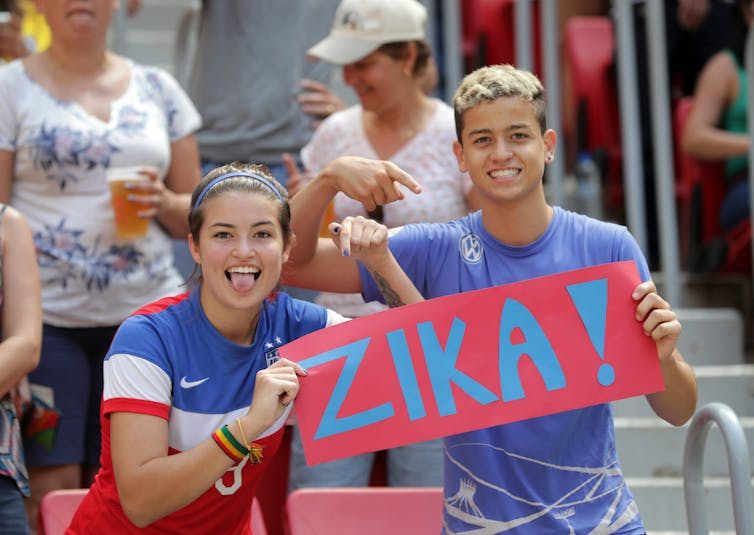
In 2016, the threat of the Zika virus resulted in many top athletes electing to sit out the Rio Olympic Games. At the 2010 Commonwealth Games held in Delhi, India, Canadian swimmer and former world-record holder Annamay Pierse contracted dengue fever and never recovered, ending her athletic career. And during the Spanish flu, professional baseball games continued as normal, resulting in many players contracting the virus.
Rewards may outweigh the risks
Despite this, many athletes may deem the rewards outweigh the risks. Athletes are well aware of the controversial Goldman’s dilemma, a research study that found 52 per cent of elite athletes surveyed said they would take a drug that would guarantee an Olympic gold medal even if it meant they would die five years later. While some researchers have challenged these results over the years, Goldman’s results highlight the value of the Olympic Games to world-class athletes.The Summer Olympic Games occur once every four years, and for the athletes, it is a culmination of perhaps a decade of training and preparation for a single moment. So it is reasonable to assume there are many athletes willing to take the risk to become an Olympian and have a chance at winning a gold medal.
While the Olympic Games are significant to the athletes, they are equally important to the world. The Olympic Charter states:
The goal of Olympism is to place sport at the service of the harmonious development of humankind, with a view to promoting a peaceful society concerned with the preservation of human dignity.If COVID-19 recedes in the coming months, the Olympic Games may be able to deliver some sense of healing — uniting nations in celebration. If the disease continues to grow exponentially, its trajectory will force the IOC to cancel or suspend the Games.
Ultimately, when it comes to COVID-19, we don’t know what we don’t know, and perhaps the IOC’s delay for a final decision may just be prudent at this time.
Nicole W. Forrester, Assistant Professor, School of Media, Ryerson University and Lianne Foti, Assistant Professor , University of Guelph
This article is republished from The Conversation under a Creative Commons license. Read the original article.
Labels:
Article,
coronavirus,
Modern Olympics,
Politics,
Tokyo Olympics
Subscribe to:
Comments (Atom)